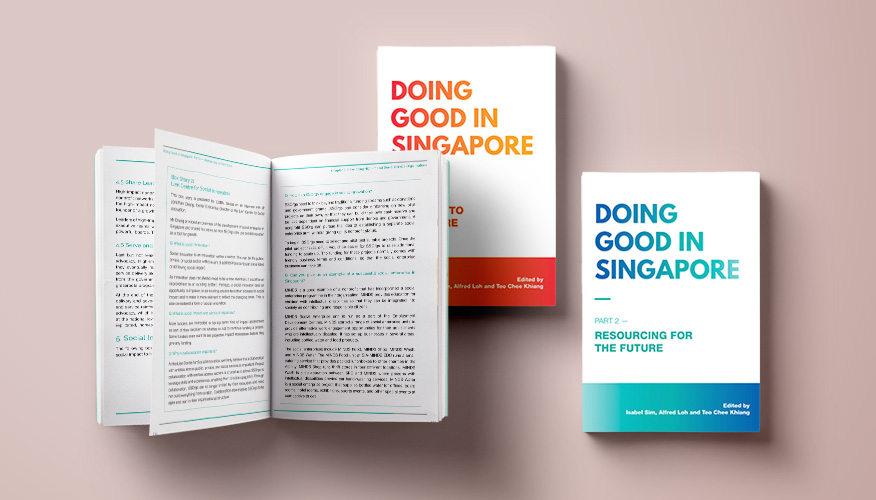Using Social Innovation as a Tool for Growth
Friday May 17,2019 | Social Innovation

Many of society's most pressing challenges today require innovative solutions that span organisations, sectors and disciplines. In a bid to help social service organisations (SSOrgs) navigate and adapt to the changes in the sector, the NUS Centre for Social Development Asia published two books titled Doing Good in Singapore: Part 1—Adapting to the Future and Part 2—Resourcing for the Future.
Below is an excerpt from Chapter 6: Developing High-Impact Social Service Organisations where Jonathan Chang, former executive director of the Lien Centre for Social Innovation, provided an overview of the development of social innovation in Singapore and shared his views on how SSOrgs can use social innovation as a tool for growth.
Click here to download the books from the Charity Council's website.
Q: What is social innovation?
Social innovation is an innovation within a sector. This can be the public, private, or social sector, with the aim of addressing a particular social issue or achieving social impact.
An innovation does not always need to be a new invention; it could be an improvement to an existing system. Perhaps, a social innovator sees an opportunity to improve on an existing solution to further increase its social impact and to make it more relevant to reflect the changing times. This is also considered a form of social innovation.
Q: What is social impact and why is it important?
More funders are interested in having some kind of impact assessment as part of their decision on whether or not to continue funding a project. Some funders even want to see projected impact assessment before they give any funding.
Q: Why is collaboration important?
At the Lien Centre for Social Innovation, we firmly believe that collaboration with entities across public, private, and social sectors is important. Project collaboration with entities across sectors is crucial as it allows SSOrgs to leverage skills and experiences, enabling them to scale up quickly. Through collaboration, SSOrgs are no longer limited by their resources and need not build everything from scratch. Collaboration also enables SSOrgs to be agile and lean in their organisational structure.
Q: How can SSOrgs engage in social innovation?
SSOrgs need to think beyond traditional funding streams such as donations and government grants. SSOrgs can consider embarking on new pilot projects on their own, so that they can build their own cash reserve and be less dependent on financial support from donors and government. A nonprofit SSOrg can pursue the idea of establishing a separate social enterprise arm, without giving up its nonprofit status.
To begin, SSOrgs need to select and pilot test suitable projects. Once the pilot project takes off, it would be easier for SSOrgs to raise additional funding to scale up. The funding for these projects normally comes with friendly business terms and conditions, so that the social enterprise business can take off.
Q: Can you give us an example of a successful social enterprise in Singapore?
MINDS is a good example of a nonprofit that has incorporated a social enterprise programme in their organisation. MINDS provides education for children with intellectual disabilities so that they can be integrated into society as contributing and responsible citizens.
MINDS Social Enterprise unit is run as a part of the Employment Development Centres. MINDS started a range of social enterprise units to provide alternative work engagement opportunities for their adult clients who are intellectually disabled. It has set up businesses in several areas, including bottled water and food products.
The social enterprises include MINDS Food, MINDS Shop, MINDS Wash, and MINDS Water. The MINDS Food unit at SIA-MINDS EDC runs a small catering service that provides packed lunchboxes to other charities in the vicinity. MINDS Shop runs thrift stores in four different locations. MINDS Wash is a collaboration between SPC and MINDS where persons with intellectual disabilities provide car hand-washing services. MINDS Water is a social enterprise project that supplies bottled water for offices, board rooms, hotel rooms, exhibitions, sports events, and other special events at competitive prices.
All net revenue earned from the sale of their products and services go directly towards paying a monthly allowance for their clients’ work and for their lunch expenses while undergoing training at Employment Development Centres.
Q: How can social innovation be facilitated?
SSOrgs should construct a team in which there is a high degree of diversity in background and work experience. This would prevent SSOrgs from developing groupthink or having overlapping skills that might not be beneficial for growth. It is also important to keep the organisational structure as flat as possible, removing layers of unnecessary bureaucracy which would otherwise impede innovative thinking. Innovative ideas often come not from limitation, but from the sharing of best practices and a free flow of thought process.
Q: Can you share an example of a successful social enterprise in Singapore?
A good example is Eighteen Chefs, a well-known social enterprise eatery and restaurant chain in Singapore. Eighteen Chefs was founded by Benny Se Teo, with the aim of providing troubled youths and ex-convicts with a non-judgmental working environment to help them reintegrate into society. Its recruitment policies give priority to ex-offenders over others with similar skills, to ameliorate the challenges faced by ex-convicts in finding employment. While staying committed to its social vision of employing ex-offenders and youth-at-risk, Eighteen Chefs also hires professional managers. Chef Benny shared how this structure has allowed him to both provide meaningful careers to ex-convicts while concurrently growing and running the business professionally. The restaurant chain became the first home-grown social enterprise with a strong business model that successfully wooed investors to start a franchise (Huang, 2014).